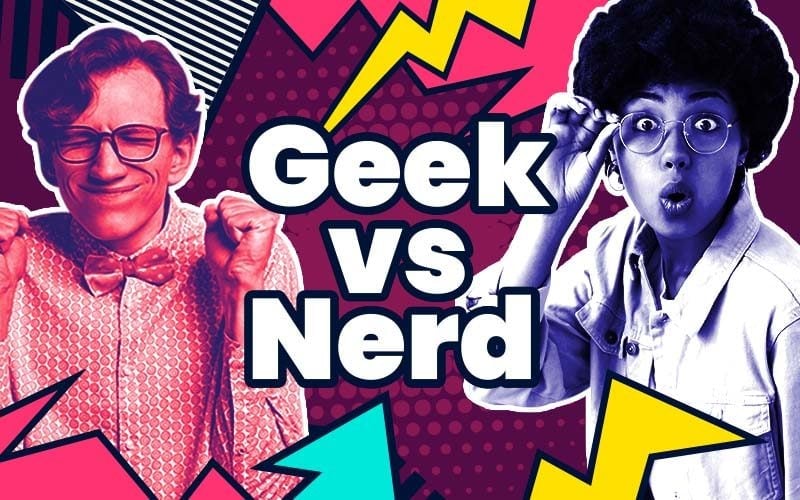Geek Vs Nerd: A Look at Geek Culture and Nerdy Obsessions

What were once considered insults have now become self-identifying terms people passionately adopt. While some consider the terms geek and nerd synonyms, what is the real difference between a geek vs nerd? Is there any difference at all? Is it based on an opinion? Etymology? A dictionary definition?
Let’s take a deep dive into the geek vs nerd debate by looking at the history, common usage, and thoughts from famous geeks and nerds.
The Geek Definition
While the geek vs nerd definition requires debate today because the terms seem interchangeable, they have vastly different etymologies.
In the 20th century, the word “geek” was used to describe a carnival performer that had such little skill that they relied on biting the heads off of live animals to keep the crowds entertained. They couldn’t perform any tricks that required skill, so all they could do was rely on shock factor. The term could be a derivative of the word “geck,” which comes with varying definitions depending on the centuries and countries it was used in. Of its many definitions, “simpleton or fool” stands out as one of the most common uses. It also meant “to mock or cheat,” which makes sense as the crowd would mock the performer, and the performer cheated the audience of a good performance.
As not many people perform in carnivals anymore, the word changed from carnie slang to a term to describe people without social graces. Geeks were awkward outcasts with no social skills to speak of.
However, there’s been a recent reclaiming of the word. Instead of accepting it as an insult for the socially awkward, people proudly proclaimed themselves as geeks. They were too busy focusing on a passion, such as Dungeons and Dragons or Star Wars, to care about being cool. As a result, the word sheds its negative connotations and geek culture becomes a community, rather than a label.

The Nerd Definition
The first application of the word “nerd” bares little resemblance to the definition today. It appeared in Dr. Seuss’s If I Ran the Zoo, published in 1950: a book which has now been discontinued due to racist imagery.
The narrator says he will collect “a Nerkle, a Nerd, and a Seersucker too” for his zoo.
A year later, Newsweek reported about the term nerd, a popular new synonym for “drip” or “square” in Detroit. By the 1960s, the popularity of the word spread across the country.
But where did Dr. Seuss even get the word “nerd” from?
In the 1940s, people used the word “nert” as a short form of nutcase to describe a “crazy” person. He could have drawn inspiration for the nonsensical species from this term.
In the late 60s and early 70s, another word with an alternative spelling became common on college campuses. “Knurd” (reverse spelling of drunk) became a term to describe someone that skipped intoxication in favor of studying. When pronounced, “knurd” sounds identical to “nerd,” and nerd culture started to form around those who decided to focus on intellectualism rather than partying.
The Distinction: Geek vs Nerd
One of the best examples of the difference between a nerd and a geek comes from a sketch called Reel Quotes Game Show from Season 35 Episode 11 of SNL. Episode host Charles Barkley plays a contestant on a game show and he needs to finish famous movie quotes to get points. Both he and Kristen Wiig get them horribly wrong, much to the host’s dismay (played by Bill Hader).
Hader starts the quote “May the force be” and of course the answer he’s looking for is “with you,” the ending to the famous Star Wars quote. However, Barkley answers “equal to the mass times acceleration.”
Annoyed, Hader asks how he could possibly know that. Barkley answers “I’m not a dummy, I just haven’t seen a lot of movies.”
In this sense, Hader would be the geek and Barkley would be the nerd. Hader knows about Star Wars, and Barkley knows about physics.
A nerd shows their intelligence, generally in the educational field. A geek knows a lot about a certain topic, generally a fandom.
Weird Al Yankovic Weighs In
Weird Al Yankovic, a well-known music geek, weighs in on the discussion and says, “To me, a nerd is somebody that would be intelligent perhaps to the point of being a bit socially awkward and a geek is somebody that is not necessarily intelligent, usually they are, but they are usually savant-like experts in a particular subject. I know the standard definition of a geek is a person that bites the heads off birds, but I don’t think that’s been in use for quite some time. But there are certainly nerds that are geeks and geeks that are nerds. There are also pure geeks and pure nerds.”
Is There Overlap?
It’s a well-worded distinction. There can of course be overlap – you can be a geeky nerd or a nerdy geek – but generally, a nerd can use their intelligence to discover new things. For example, the nerd can use the equation of force equals mass times acceleration to figure out a problem. A geek knows a whole lot about a particular subject. Memorizing everything there is to know about the Wizarding World of Harry Potter takes a good memory, but doesn’t necessarily require intelligence.
You could be a nerdy geek that takes all those facts about Harry Potter and writes fan fiction or comes up with theories about the stories beyond the original source material. That takes creativity and critical thinking, both traits more often categorized as “nerdy.”
Burr Settles, a science nerd and music geek, took to Twitter for research on the uses of geek vs nerd. He said, “In broad strokes, it seems to me that geeky words are more about stuff (e.g., “#stuff”), while nerdy words are more about ideas (e.g., “hypothesis”). Geeks are fans, and fans collect stuff; nerds are practitioners, and practitioners play with ideas. Of course, geeks can collect ideas and nerds play with stuff, too. Plus, they aren’t two distinct personalities as much as different aspects of personality.”
So while Settles outlines the distinction, he reminds his readers that there’s more overlap than differences. Generally, you’re talking about different facets of one person’s personality, rather than two different people. It’s not as much a conversation of geek vs nerd, but determining which parts of you are nerdy and which are geeky.
Geek vs Nerd: The Verdict
At the end of the day, it doesn’t matter how people choose to apply the word to themselves. If someone wants to say they’re a nerd for Star Trek, and someone else wants to say they’re a geek for chemistry, they aren’t hurting anyone. While we can look at the history of the works geek and nerd, we can’t dictate how people choose to use them today.
So in the debate of geek vs. nerd, we all win when we let people be geeky and nerdy about whatever makes them happy.


I consider myself a Pop Culture Geek, but I must be a little nerdy since I earned a Masters’ degree.
Amazing article! I loved how you explored the distinction between geek culture and nerdy obsessions. It’s fascinating to see how these two terms, often used interchangeably, actually have subtle nuances. The way you analyzed the various aspects, from pop culture to technology, was on point. As a self-proclaimed geek, I thoroughly enjoyed reading this and it validated my passion for all things geeky. Keep up the fantastic work! Gary Ford.